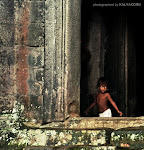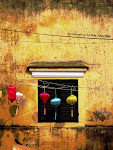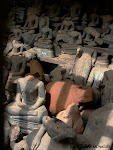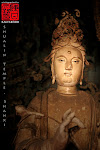A Reflection on the Seminar on Confucius (1 April 2011)
By Kalyakorn Naksompop
Written on 1 April 2011
Yesterday, if you talked to me about Confucius or Master Kong (Kong Zi), I would have seriously rolled my eyes thinking you’re “one of those people” – you know, the people who like to say that every woman is supposed to stay home and respect their husband or that children have to submissively listen to their parents regardless of what’s right and what’s wrong because it’s their “duty”. Thanks to A. Korsak Dhammacharoenkij and K. Nopporn Thepsitthar, who spoke at a seminar on Confucianism held by Executive Go Club, I now understand that those people are just self-claimed Master Kong’s worshipers who have actually twisted the real teaching of this Chinese noble to protect their role as “the man” of the society. Yes, I’m talking about the belief that men are more important than women, which has deepened in Chinese culture for long. Evidence? Remember how One-Child-Policy had impact the imbalance of male and female population in China? And people said that a big part of this belief is Confucianism. I must confess that even I once blamed it on Master Kong but now I know I was wrong.
One of the fundamental principles Kong laid in his philosophy is the balance in the society, also known as social harmony. This harmony can only be maintained if everybody in the society knows their duty and is committed to their duty with respect to one another. This includes the duty of men and women, parents and children, and leaders and their people as expressed in his words, “There is government, when the prince is prince, and the minister is minister; when the father is father, and the son is son" (Analects XII, 11, trans. Legge). The bottom line is everybody has to be happy and the only way everybody can be happy is to maintain this harmony.
“How?” one may ask. Kong proposed that social harmony begins with the understanding of ethics. It is when you know your role in the society and perform your duty with the best of your ability in the right manner – not to step over other people’s foot and neither to under do nor overdo your job. What happens when one knows his/her role but doesn’t do his/her job? Take what’s happening in Libya as example. Gaddafi knows he’s the leader of the country. He has authorities in his hands. What he does can and does affect his country and its people. In other words, he knows he has power but has he been using it rightly? I would say no. Did he fail to perform his duty as the leader of the country? I say yes. My guess is Gaddafi has completely forgotten that he can only be a leader when there are followers. Once he forgets his duty, people are not happy, they don’t feel the need to perform their duty, the harmony then disappears, and many other problems are to follow.
Comes with ethics is morality. In fact, morality is a very big word in Confucianism that stresses on how one should act towards others. Kong’s philosophy circles around humans and their relationship with one another. To make the relationship “work”, one must recognize that everybody is equal. Since everybody is equal, everybody deserves equal respect and that everybody should be treated with respect – as much respect as you want to be treated from others. Hence, the Golden Rule: "do not do unto others what you would not have them do unto you."
If Confucius believed in equality, it’s not possible for him to teach men to value only men or mothers to value only sons. Nevertheless, new questions arose: what went wrong? Why is the view on gender of Chinese, whose culture was built around Kong Zi’s teaching, so….. controversial?
When One-Child-Policy was much more strictly enforced, it was common to see dead female bodies on random streets. What can this tell us? Daughters are not as much appreciated as sons? Because women are not seen as important as men? This is definitely not equality.
Again, what went wrong?
Looking back at Master Kong’s teaching, I’ve realized one thing. Confucianism accentuates the duty of every individual: leader as leader, worker as worker, father as father, and wife as wife. Depending on how you look at it, his teaching can be interpreted in many ways. One is that women are supposed to stay at home. If women are to stay at home, men are to work and to financially support the family. Men are then automatically viewed as providers while women are supporters. If this is the case, to the eyes of the society, who do you think are more important: provider or supporter?
As a woman who strongly believes in equality and with respectful consideration that Master Kong also strongly believes in this very same principal, I admit that I too see this as a kind of discrimination. If everybody is truly equal, why are women limited to stay home and why only men are entitled to work outside?
However, Confucius lived thousands of years ago. In his time when it was much tougher, men were the priority of the society since their physicality more fitted to be the provider. Though to him, women are not just supporters as he saw that the duty at home was as equally important as the duty out of home, many might fail to recognize this fact and chose to interpret his teaching the way it benefits them best.
But even with this argument, my question remains: isn’t separating duties by gender a kind of discrimination?
Then, I remember. One of Kong’s teaching was about how different people have different talents and are good at different things. Keep in mind that in his time, people with fighting skills, literacy, or any other skills necessary to serve the emperor were being valued more. However, Kongzi were able to overlook that social norm and recognized that individuals should be encouraged to pursue in what they are good at. Therefore, if there are women who are good at something other than house work and are willing to step outside to work like men, I believe that Master Kong, as liberal as he was, would have opened to their ability than their gender. The man spent years teaching people about equality. There is no way that being man or woman matters as long as one performs their duty with dignity and in the best of their ability.
So, the problem with Confucianism is definitely not Master Kong’s actual philosophy. In fact, I’ve learned that it is rather treasure for many later generations what he left in his teaching. Then, what went wrong? Hint: we have to look at who twisted his teaching, in what context, and how that benefits them.
การใช้ข้อมูลวิจัยจัดตารางออกอากาศ
14 years ago


.jpg)

.jpg)
.jpg)


